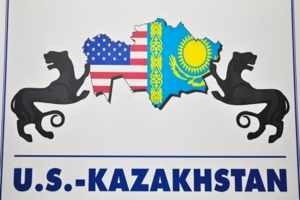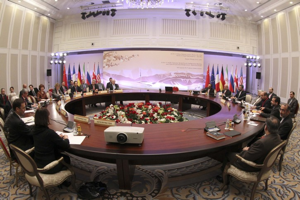CACI Analyst, April 3, 2013
Poor Performance Of Energy Companies Compromise Kazakhstan's 2013 Growth Agenda
by Georgiy Voloshin (04/03/2013 issue of the CACI Analyst)
While Kazakhstan prepares to launch a series of costly infrastructure projects, including the modernization of its three oil refineries and the much-awaited start of production at the Kashagan oil field, the economic data recently unveiled by the country’s Statistics Agency and major energy companies are far from reassuring. In early 2013, Kazakhstan’s statistics body stated in its annual report that the Kazakhstani economy had grown by a meager 0.5 percent in 2012 as compared to 3.5 percent one year before, let alone the spectacular figures reported in earlier periods both before and even during the world financial crisis. According to most expert opinions, the structure of Kazakhstan’s economy, which is still heavily dependent on the lucrative oil and gas sector as well as mining activities, has largely remained unchanged, despite a broad range of initiatives aimed at greater diversification. At the same time, the major energy companies whose cumulative revenue permitted the country to prosper in better times now face multiple challenges and can further undermine Kazakhstan’s growth prospects.
Modernization Efforts On The Rise In Kazakhstan
by Georgiy Voloshin (03/20/2013 issue of the CACI Analyst)
Since the reorganization of Kazakhstan’s Government ordered by President Nursultan Nazarbayev in his keynote address to the nation (“Kazakhstan-2050”) delivered in December 2012, several Kazakhstani ministries have already put forward ambitious modernization proposals. On March 12, the newly established Ministry of Regional Development, whose head is also serving as the first deputy of the country’s Prime Minister, proposed to set up entrepreneurship support centers in every provincial capital as well as in the cities of Astana and Almaty and several preselected remote locations. Currently, two pilot projects are already underway in Almaty and Shymkent, while five provinces benefit from the presence of mobile centers providing information and consultative services to local small and medium enterprises. The purpose of such new structures would be to offer exhaustive information about the latest legal and regulatory changes in Kazakhstan, available funding opportunities and potential ways of further economic development.
Toward A New Kazakhstan-U.S. Partnership
by Richard Weitz (03/20/2013 issue of the CACI Analyst)
In accordance with its efforts to diversify its allegiance with major powers, Kazakhstan supports a strong U.S. economic and defense presence in Central Asia. The U.S. is equally interested in preserving Kazakhstan’s balanced relationship with the other great powers. Renewing the partnership requires realigning its focus as the U.S. military presence in Central Asia declines but U.S. interests do not, while Kazakhstan responds to China’s growing regional role and strong Russian interest in maintaining Moscow’s primacy in the region. An effective U.S. diplomatic approach toward the region requires reaffirming U.S. support for the political and economic independence of Kazakhstan and its neighbors.

Kazakhstan Offers Mediation In Nuclear Talks Between Iran And West
by Georgiy Voloshin (03/06/2013 issue of the CACI Analyst)
On February 26-27, Kazakhstan’s southern capital, the city of Almaty, hosted another round of international talks regarding Iran’s nuclear program. This high-level meeting attended by representatives of the P5+1 group of countries and Iranian officials was earlier confirmed by the European External Action Service, which is currently acting as one of Tehran’s main interlocutors. Although Kazakhstan is not formally involved as a negotiating partner, it decided once again to use its global reputation as a firm supporter of the International Atomic Energy Agency and the non-proliferation policy in providing its territory for the first round of talks in 2013.







